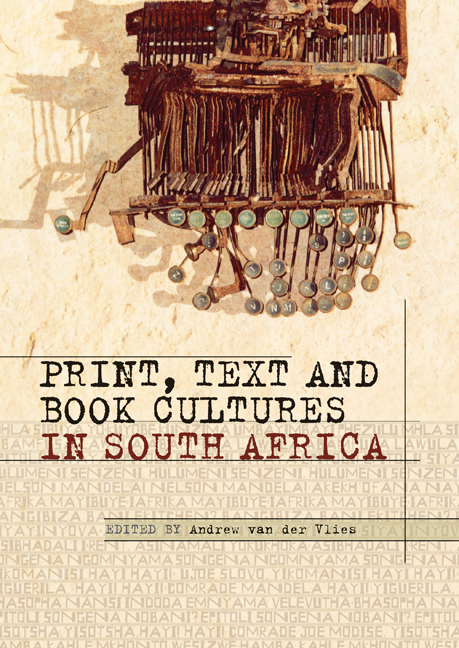Book contents
- Frontmatter
- Contents
- Acknowledgements
- Abbreviations and acronyms
- 1 Introductory
- 2 Print Cultures and Colonial Public Spheres
- 3 Local/Global: South African Writing and Global Imaginaries
- 4 Three Ways of Looking at Coetzee
- 5 Questions of the Archive and the Uses of Books
- 5.1 Colin Rae's Malaboch: The Power of the Book in the (Mis)Representation of Kgaluši Sekete Mmalebôhô
- 5.2 “Send Your Books on Active Service”: The Books for Troops Scheme during the Second World War, 1939–1945
- 5.3 From The Origin of Language to a Language of Origin: A Prologue to the Grey Collection
- 6 Orature, Image, Text
- 7 Ideological Exigencies and the Fates of Books
- 8 New Directions
- Contributors
- Index
5.3 From The Origin of Language to a Language of Origin: A Prologue to the Grey Collection
from 5 - Questions of the Archive and the Uses of Books
Published online by Cambridge University Press: 21 April 2018
- Frontmatter
- Contents
- Acknowledgements
- Abbreviations and acronyms
- 1 Introductory
- 2 Print Cultures and Colonial Public Spheres
- 3 Local/Global: South African Writing and Global Imaginaries
- 4 Three Ways of Looking at Coetzee
- 5 Questions of the Archive and the Uses of Books
- 5.1 Colin Rae's Malaboch: The Power of the Book in the (Mis)Representation of Kgaluši Sekete Mmalebôhô
- 5.2 “Send Your Books on Active Service”: The Books for Troops Scheme during the Second World War, 1939–1945
- 5.3 From The Origin of Language to a Language of Origin: A Prologue to the Grey Collection
- 6 Orature, Image, Text
- 7 Ideological Exigencies and the Fates of Books
- 8 New Directions
- Contributors
- Index
Summary
In his 1878 account of a five-month visit to South Africa, Anthony Trollope described his experience of the Grey Collection reading room in Cape Town. With the kind of sly provocation that made his account such a talking point at the Cape, he remarked:
It would be invidious to say that there are volumes so rare that one begrudges them to a distant Colony which might be served as well by ordinary editions as by scarce and perhaps unreadable specimens. But such is the feeling which comes up first in the mind of a lover of books when he takes out and handles some of the treasures of Sir George Grey's gift (Trollope 1878, 74).
In 1861 George Grey, the singularly ambitious colonial autocrat who before the age of 50 had been governor of South Australia (1840–45), New Zealand (1845–53) and the Cape Colony (1854–61), donated some 5,200 items to the South African Library. With a silver trowel he had laid the foundation stone of the present building at the foot of the Company Gardens in September of 1858; in 1860 it was completed and—apart from a period between 1942 and 1944 when valuable holdings were moved to Stellenbosch for fear of enemy action—his bequest has been housed here ever since, kept, as stipulated, “wholly separate and distinct from the general Collection of Books in the Library”.
In the kind of cultural transaction often repeated in the nineteenth century, a private collection formed the nucleus of Victorian civic culture and, in this case, a British colonial identity in the process of formation. For a rising Anglophone mercantile class at the Cape, “The Grey” transformed Cape Town's library at a stroke into “a local institution worthy of a much larger European city” (Dubow 2006, 48). Ever since, it has been dutifully celebrated by its custodians as “a mirror of Western culture” and a “treasure for all times”.2 Yet equally, from Trollope's account onwards, a note of unease seems to have been present when considering how exactly such texts might fare or signify when (re)located at the tip of Africa.
- Type
- Chapter
- Information
- Print, Text and Book Cultures in South Africa , pp. 252 - 284Publisher: Wits University PressPrint publication year: 2012

